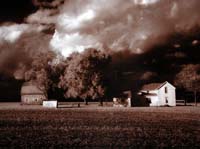
They are not a sentimental lot. Nor particularly keen on ostentatious consumption. Thrift and the demonstration of thrift is a way of displaying one’s virtue. If you fail against all odds, and are thrifty, you may gain some sympathy from your neighbors. But if you fail after building a new house, or taking a winter vacation, you will most likely be blamed for managing badly: such expenditures, many durable farmers believe, are simply symptomatic of deeper failings. At least, that is the story Kate Dudley tells of Minnesota, and that I heard from farmers during the Farm Crisis–both those who failed and those who expressed sympathetic or condemning attitudes towards those who failed.
The weather is unforgiving, the markets are unforgiving, and frequently the neighbors are, as well.
Is it any wonder people of the farms and small towns so often feel embattled when the powers that be–urban, affluent, educated–either sentimentalize them or reform and regulate them?
The rural scenery of today has not been long in its creation. One hundred fifty years ago, most of this land was thinly settled. The Grand Prairie of central Illinois refused to yield to the puny plows available. It was often a frightening and dangerous place, with grasses and forbes towering above a person’s head, susceptible to fire when dry. Much of it was boggy, and malarial. The first settlers sought the forested hills of deep southern Illinois, and the mixed prairie-woodland of the hillier regions ringing the Grand Prairie, where Indians had long burned the grasslands to keep openings for wildlife and farming.
continued
The weather is unforgiving, the markets are unforgiving, and frequently the neighbors are, as well.
Is it any wonder people of the farms and small towns so often feel embattled when the powers that be–urban, affluent, educated–either sentimentalize them or reform and regulate them?
The rural scenery of today has not been long in its creation. One hundred fifty years ago, most of this land was thinly settled. The Grand Prairie of central Illinois refused to yield to the puny plows available. It was often a frightening and dangerous place, with grasses and forbes towering above a person’s head, susceptible to fire when dry. Much of it was boggy, and malarial. The first settlers sought the forested hills of deep southern Illinois, and the mixed prairie-woodland of the hillier regions ringing the Grand Prairie, where Indians had long burned the grasslands to keep openings for wildlife and farming.
continued

| PAGE |<< | 1 | 2 | 3 | 4 | 5 | 6 | 7 | 8 | 9 | 10 | | 11 | 12 | 13 | 14 | 15 | 16 | 17 | 18 | 19 | 20 | |
||
| D. Gorton's Home Page Jane Adams' Home Page Memory and Judgment: Mississippi The White South Contact Us |
|||||||||
|
This page was last modified on:
|
|||||||||